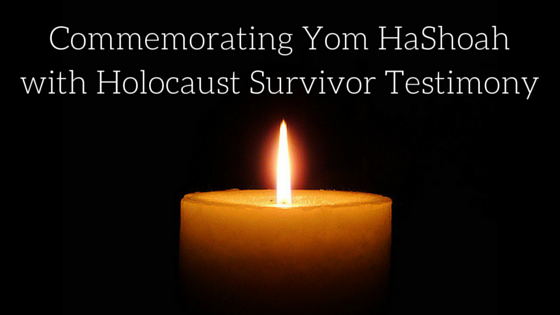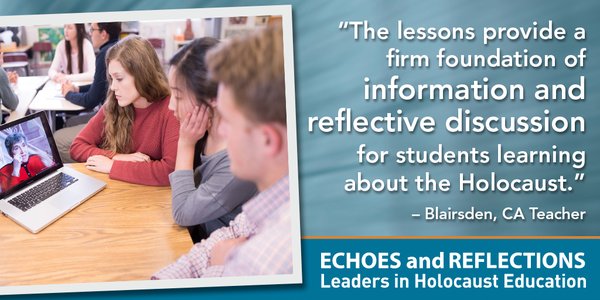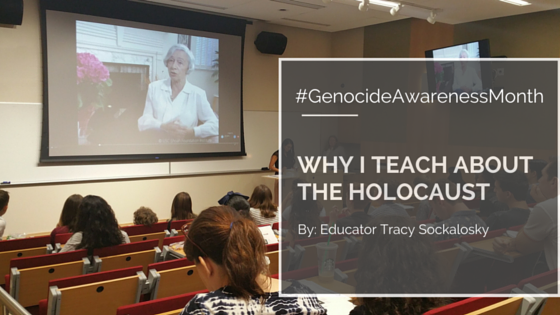Holocaust Remembrance Day, or Yom HaShoah as it’s known in Hebrew, commemorates and honors the victims and survivors of the Holocaust. This year, people around the world will remember the victims of the Holocaust May 4-5, 2016.
Throughout the entire month of April, USC Shoah Foundation remembered the victims of genocide with testimony, educational resources and personal stories for Genocide Awareness Month. It is fitting for Yom HaShoah to be the final day of remembrance after commemorating the Armenian, Cambodian, Guatemalan and Rwandan genocides. However, you can remember and learn from the survivors of the Holocaust and other genocides all year long through eyewitness testimony preserved in the Visual History Archive. So today and every day we encourage you to engage with testimony, integrate our educational resources in your classroom and be inspired through testimony.

Watch Testimony from the Visual History Archive
Explore the Visual History Archive at an access site to engage with all 53,000 eyewitness testimonies. Or watch testimonies at home via the Visual History Archive Online. Search by interviewee name, experience group or by over 60,000 indexed terms.We found the clip below by typing in “Yom HaShoah” into the index search, which is mentioned in 118 testimonies.
Yael Avner Observes Yom HaShoah
Yael Avner and her interviewer observe two minutes of silence at the sound of an air raid siren during Israel's commemoration of Yom HaShoah, Holocaust Remembrance Day.
Online Exhibits
The Institute, working closely with educator experts in the field of genocide studies, produces online lessons and exhibits, which incorporates footage of testimonies from the Visual History Archive. Explore exhibits in multiple languages on various experiences of the Holocaust.
Testimony Series
Explore curated testimony clips from the Visual History Archive available on our website on topics including deportation, discrimination and liberation. You can also watch special testimony series created for anniversaries and topics including 70 Stories of Auschwitz, for the 70th Anniversary of the liberation of Auschwitz in January 2015.
Teach with Testimony
Introduce your students to history of the Holocaust with our educational platform IWitness.
Integrate Holocaust survivor and eyewitness testimony into your curriculum or lesson with curated video clips across topics including anti-Semitism, propaganda, resistance and memory.

IWitness Activities
Explore eyewitness testimony at a deeper level with IWitness activities across subjects including Holocaust literature, European History and humanities.

Authored by Facing History and Ourselves, the Mini Quest activity, Choosing to Rescue, explores the experiences of three rescuers from the Holocaust and consider what influenced the choices they made. Students locate, describe and reflect on decision points within the testimony by using a graphic organizer. Students also use evidence from the testimony to consider how identity, point of view and surroundings influenced the decisions they made.
Learning Aims: The activity concludes with students writing a personal reflective journal that conveys their thoughts and learning about the choices rescuers made during the Holocaust. Students will share their work and then discuss their thinking with classmates.
Explore more IWitness Activities
Use IWitness as an extension to Echoes and Reflections

Rich with testimony clips from Holocaust survivors, rescuers and American liberators, and seamlessly integrated into 10 multipart lessons, Echoes and Reflections explores major themes associated with the Holocaust. The product, developed for educators of students in the United States ages 14 and up, covers topics that include anti-Semitism, Nazi Germany, the ghettos, the Final Solution and resistance. IWitness includes several activities that can be integrated into lessons including Information Quest: Kristallnacht.
Produced by the Anti-Defamation League, USC Shoah Foundation — The Institute for Visual History and Education, and Yad Vashem.
Inspired by Testimony
Read stories on the blog Through Testimony, written by educators, students, researchers, staff and individuals around the world who have been inspired by Holocaust survivor testimony.
 How will you commemorate Yom HaShoah this year? Share your thoughts @USCShoahFdn or on our Facebook page.
How will you commemorate Yom HaShoah this year? Share your thoughts @USCShoahFdn or on our Facebook page.




